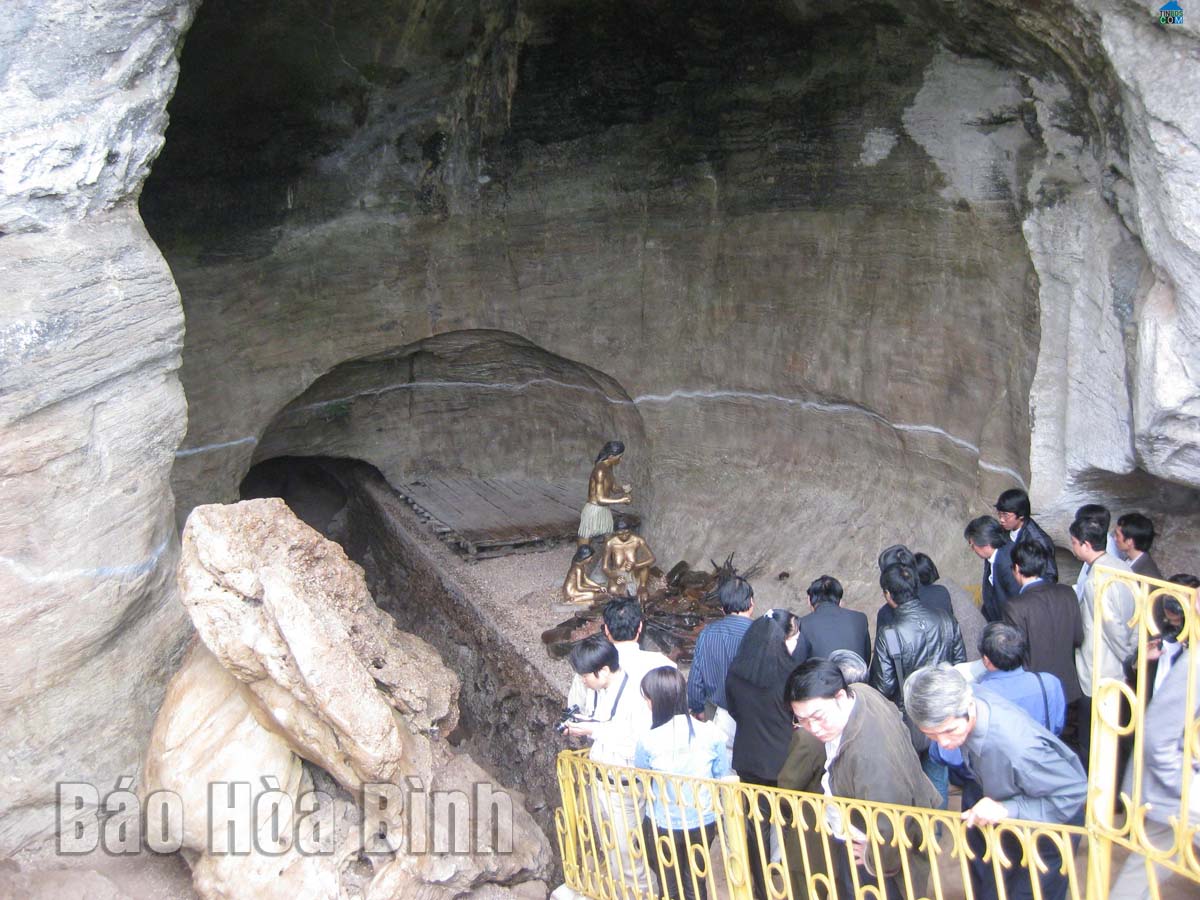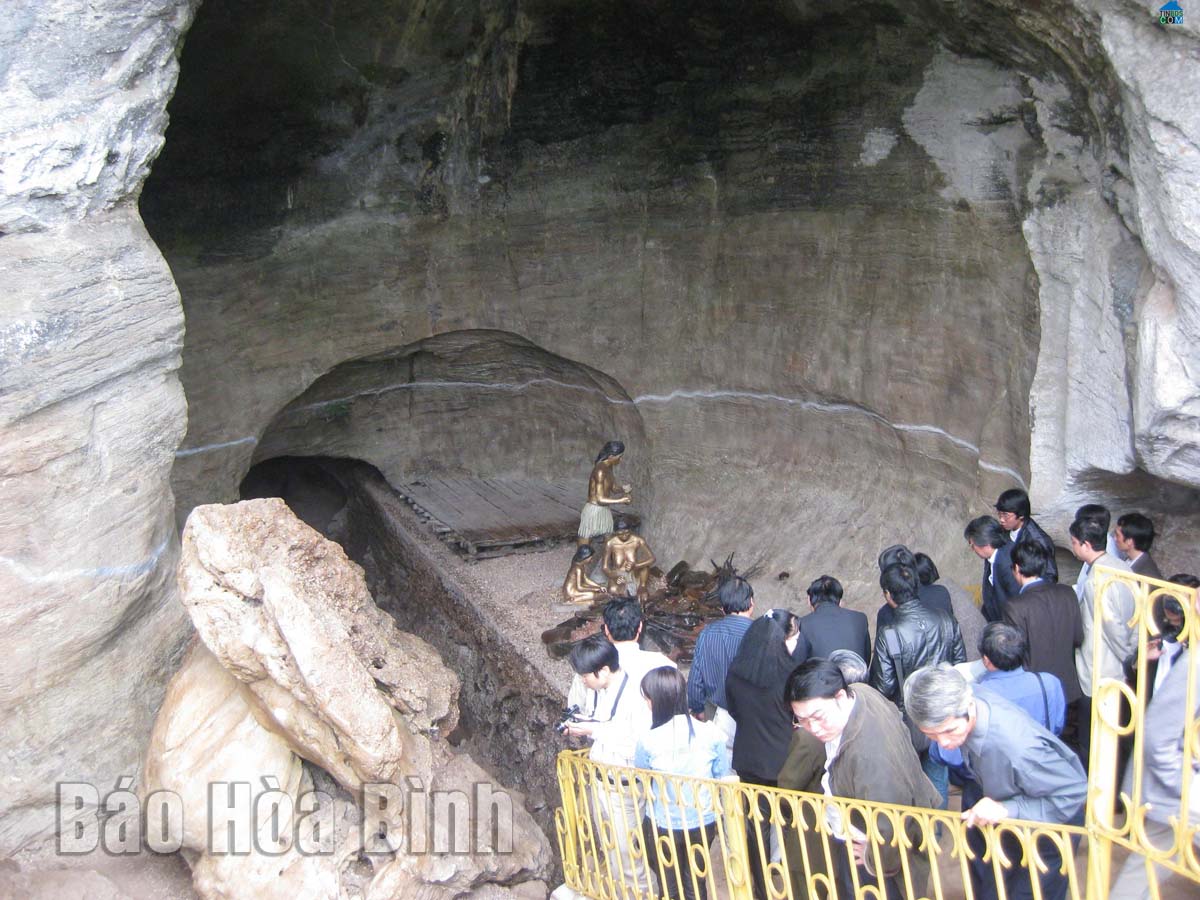
(HBO) – With 72 caves and archaeological relic sites, Hoa Binh province has been identified as one of the cradles of the "Hoa Binh Civilisation” by archaeologists, scientists, and anthropologists. Over the past years, local authorities have paid great attention to the conservation and promotion of this civilisation’s values.
"Hang xom Trai” (Trai Village Cave) in Tan Lap commune of Lac Son district is
one of the typical archaeological relic sites of the "Hoa Binh Civilisation”.
According to the provincial Museum, karst caves
in Hoa Binh attracted attention from archaeologists of the French School of the
Far East in the 1920s. Through surveys, excavations, and studies, scientists
found that those karst caves contain vestiges of a civilisation that developed
between the late period of the Old Stone Age’s and the early period of the New
Stone Age, and named it "Hoa Binh”.
The "Hoa Binh Civilisation” existed about 30,000
- 4,000 years ago not only in Vietnam but also other places across Southeast
Asian such as Indonesia, Myanmar, Thailand, and the Philippines, as well as
China. More than 130 places dating back to the civilisation have been found in
Vietnam, and over half of them were discovered by Vietnamese archaeologists
during 1966 - 1980. Those relics scattered in various localities but
concentrated in Hoa Binh (72 sites) and Thanh Hoa (32 sites).
The typical relic sites and artefacts discovered
in Hoa Binh reflect the life and livelihoods of prehistoric humans. Most of the
relics have been protected, restored, and submitted to seek recognition, and
many of them have gained the status of national importance.
In the recent past, all-level Party committees,
administrations, and people of all ethnic groups in the province, especially
the cultural sector, have been stepping up the conservation and promotion of
this civilisation’s cultural values. They have enhanced cooperation with
domestic and international organisations in civilisation research, surveyed
archaeological relics, and taken measures for managing, conserving, and bringing
into play its values. In addition, communications in different forms and
languages have been stepped up to introduce the Hoa Binh Civilisation to major
cultural, economic, and political centres of Vietnam and at international
scientific conferences.
To mark the 90 years since the world recognised
the Hoa Binh Civilisation and gave it the name (1932 - 2022), at the beginning
of this year, the provincial People’s Committee issued Plan No. 50/KH-UBND on
the organisation of cultural, sports, and tourism events.
Luu Huy Linh, Deputy Director of the provincial
Department of Culture, Sports and Tourism, said the cultural sector is planning
activities to celebrate the 90th anniversary of the recognition and naming of
the "Hoa Binh Civilisation”, including seeking permission for excavating some
archaeological caves in Lac Son district, inviting scientists to a national
seminar on the civilisation, and working with the People’s Committee of Hoa
Binh city to choose a road to name "Colani” so as to honour contributions by
French archaeologist Maeleine Colani who discovered and named the civilisation
"Hoa Binh”./.
With an increasingly vibrant and widespread emulation movement aimed at building cultured residential areas and cultured families, Yen Thuy District has been making steady progress toward improving both the material and spiritual well-being of its people, while fostering a civilized, prosperous, beautiful, and progressive community.
Once lacking recreational spaces and community facilities, Residential Group 2 in Quynh Lam Ward (Hoa Binh City) has recently received attention for the construction of a new, spacious, and fully equipped cultural house. The project followed the model of state support combined with public contributions in both labor and funding.
The "All people unite to build cultural life" movement, which has been effectively integrated with Kim Boi district’s socio-economic development goals, is fostering a lively spirit of emulation across local residential areas, hamlets, villages, public agencies, and enterprises. In addition, through the initiative, traditional cultural values are being preserved and promoted, while community solidarity and mutual support in poverty reduction and economic development are being strengthened.
A working delegation of the Hoa Binh provincial People’s Committee led by its Permanent Vice Chairman Nguyen Van Toan on June 11 inspected the progress of a project to build the Mo Muong Cultural Heritage Conservation Space linked to tourism services in Hop Phong commune, Cao Phong district.
Born and growing in the heroic land of Muong Dong, Dinh Thi Kieu Dung, a resident in Bo town of Kim Boi district, in her childhood was nurtured by the sweet lullabies of her grandmother and mother. These melodies deeply imprinted on her soul, becoming an inseparable part of her love for her ethnic group's culture. For over 20 years, this love for her hometown has driven Dung to research, collect, and pass down the cultural values of the Muong people to future generations.
In the final days of May, the Ethnic Art Troupe of Hoa Binh Province organized performances to serve the people in remote, mountainous, and particularly disadvantaged areas within the province. These were not just ordinary artistic shows, but they were the meaningful journeys aimed at spreading cultural values, enhancing the spiritual life of the people and contributing to the preservation of ethnic minority cultural identities.



